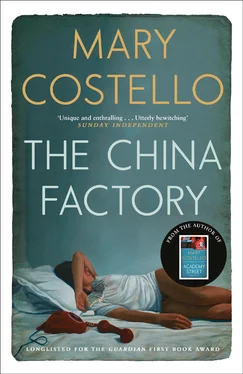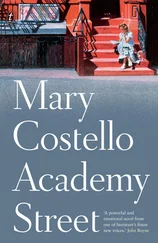She nods. ‘I did… big changes, indeed, over the years.’
‘Aye, for the better too, if you ask me,’ he says and then nods, and two women squeeze past them and when she looks up again, he is still nodding. She is completely arrested by this and recognises in the lined face and the lock of grey hair that has fallen over his forehead the same uncertainty, the hesitancy, the faltering of the eighteen year old on the mountain that day. She stares at him now. In his bleak eyes, in his high furrowed brow she sees, for the first time, something of what he too must have endured at the bottom of the hill all these years — the permanent disquiet, the forfeiture. He had known the child’s name; when it was all over she had written him the name and the destination, and how that name must have threaded its way through him, attaching itself and gnawing into him, so that in moments of anger or anguish — when he raised his voice to Imelda or Helen or to Marie, when he laid a stick on the back of a beast or kicked a stable door — was it to himself the wrath was aimed, to himself and his lonely secret, his awful privation?
‘Aye, Alice, things have changed. If things were different… Aye… It’s not the same at all today. The young are right now — they do what they like. They don’t care what anyone else thinks, and they’re right too… They’ll have no regrets then.’
She is standing in the dark of the kitchen, her handbag dangling from her arm. A light is blinking out on the bay and down below her is a land full of dark shapes. Her heart is racing. She would like to stand at the shore and look into the ocean’s depths and let the waves break over her bare feet and watch them turn and flow back out, to break on other shores. She thinks of her life, her whole existence, as a catastrophe. She drops her arm and the bag slides off and she thinks how everything has sprung from one moment, one deed — the insane beauty and shock of the flesh, the fire of the soul — with consequences that flowed out and touched and ruptured every minute and hour and day of her life ever since. That brought her to her own crime, her own awful act, on a Belfast street, the relinquishment . Greater than all that had gone before or would ever come after. Making her heart grow small, making extinct everything that was essential for a life. Was it all fated, she wonders? Was the desire fated? And the shame? And the crime — was the crime fated, too?
In the bedroom she switches on the lamp and sits on the edge of the bed. She searches for a word but there is none capable of containing what she feels. She narrows her eyes and a procession of words crosses her mind, like ticker tape, and then she feels its approach, the only word that is ample; it rises out of her in a voice she has never heard in these rooms, an exhalation, an utterance, a cry. John .
Tears fall on her hands. She hears the faint hiss of the lamp. She looks around at the walls. Eventually her heartbeat slows. There is no repose, there will be no repose, just the long wait in these rooms, and the sea sighing in the distance.












